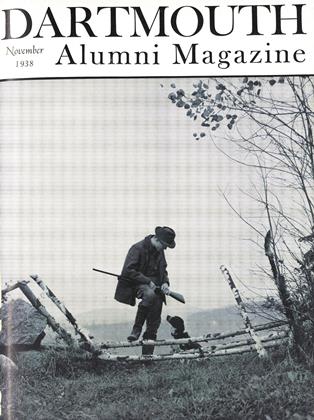by Wallace P. Rusterholtz '31. Manthorne and Burack, Inc., Boston, p. 362. #3.50.
The thesis of this book by a member of the class of 1931 is that political and religious reaction are increasing in America and that they must be halted by an appeal to "the personalities, characters and utterances of American heretics and saints." "Liberalism," in the words of John Dewey, "must now become radical." The author gives interesting thumb-nail sketches of sixteen American worthies selected from this point of view: John Robinson, Roger Williams, Ann Hutchinson, Cotton Mather, Franklin, Ballou, James Freeman, Paine, Channing, Emerson, Parker, Ingersoll, Darrow, Harry Emerson Fosdick, John Haynes Holmes and Charles Francis Potter. The selection is open to criticism. Is it quite fair to mention Edwards only as a foil against which to magnify Ballou's Universalism? Why is Jefferson omitted and Cotton Mather included? Mather's influence as a liberal is infinitesimal in comparison with that of Jefferson in spite of the fact of his acceptance of Copernican astronomy and inoculation for small-pox. In the allotment of space Paine and Ingersoll top the list of the author's heretics and saints. Darrow and Potter take precedence over Williams and Emerson. His ideal seems to be a blend of the "spectacular debunkers" Paine, Ingersoll and Darrow with the religious humanists represented by Holmes and Potter and the signers of "The Humanist Manifesto" of May 1, 1933. Holmes is the "sociologist and political scientist" of this movement; Potter is the champion of science and a creed is offered by the fifteen affirmations of "The Humanist Manifesto." Some of the most interesting pages in the book are found in the last chapter giving the differences between religious and literary humanists.
The book is interestingly written and shows wide reading. It has a good bibliography but no index. The use of secondary sources is often uncritical as in the case of Ernst's life of Williams, Sherman's superficial essays on Puritanism, and Barnes' iconoclastic book "The Twilight of Christianity." A careful perusal of the stenographic account of Darrow's famous debate with the Fundamentalist Bryan in the Dayton evolution trial (1925) which strange to say, the author does not cite nor give in his bibliography, might have suggested to him that by stressing the impasse between radicals such as Darrow and conservatives such as Bryan he not only oversimplifies matters but precludes any real understanding of the very complex problem of religion in American life.
 View Full Issue
View Full Issue
More From This Issue
-
 Class Notes
Class Notes1930*
November 1938 By ALBERT I. DICKERSON -
 Sports
SportsBig Green Teams
November 1938 By "Whitey" Fuller '37 -
 Article
ArticleGradus Ad Parnassum
November 1938 By The Editor -
 Article
ArticleDartmouth's Rebel Saint
November 1938 By ALLAN MACDONALD -
 Class Notes
Class Notes1917
November 1938 By EUGENE D. TOWLER -
 Class Notes
Class Notes1921*
November 1938 By CHARLES A. STICKNEY JR.
John M. Mecklin
-
 Books
BooksFACULTY PUBLICATIONS
May, 1922 By JOHN M. MECKLIN -
 Books
BooksThe Principles of Sociology
May, 1924 By John M. Mecklin -
 Books
BooksProhibition
FEBRUARY, 1928 By John M. Mecklin -
 Books
BooksMANUFACTURING
FEBRUARY 1929 By John M. Mecklin -
 Books
BooksCOLLECTED PAPERS OP HERBERT DARLING FOSTER
APRIL 1930 By John M. Mecklin
Books
-
 Books
BooksRobert S. Monahan '29
January, 1931 -
 Books
BooksHOW TO WRITE A MOVIE
January 1937 By Ernest Bradlee Watson '02 -
 Books
BooksPETER HARRISON, FIRST AMERICAN ARCHITECT
July 1949 By Hugh Morrison '26 -
 Books
BooksANY OLD WAY YOU CHOOSE IT: Rock and Other Pop Music, 1967-1973
March 1974 By J. MICHAEL STUART '71 -
 Books
BooksVIETNAMESE ANTICOLONIALISM 1885-1925.
JANUARY 1973 By JOHN S. MAJOR -
 Books
BooksCOLLEGE ORGANIZATION AND ADMINISTRATION,
January 1948 By Roy J. Deferrari, HOWARD F. DUNHAM '11

